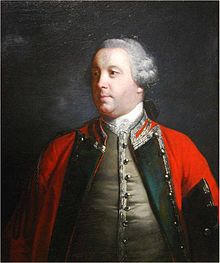
Back ادوارد كورنواليس ARZ Edward Cornwallis German ادوارد کورنوالیس FA Edward Cornwallis French אדוארד קורנווליס HE Edward Cornwallis Italian Едвард Корнволліс Ukrainian
Edward Cornwallis (5 March [O.S. 22 February] 1713 – 14 January 1776)[1] was a British career military officer and member of the aristocratic Cornwallis family, who reached the rank of Lieutenant General. After Cornwallis fought in Scotland, putting down the Jacobite rebellion of 1745, he was appointed Groom of the Chamber for King George II (a position he held for the next 17 years). He was then made Governor of Nova Scotia (1749–1752), one of the colonies in North America, and assigned to establish the new town of Halifax, Nova Scotia.[a] Later Cornwallis returned to London, where he was elected as MP for Westminster and married the niece of Robert Walpole, Great Britain's first Prime Minister. Cornwallis was next appointed as Governor of Gibraltar.
Cornwallis arrived in Nova Scotia during a period of conflict with the local indigenous Miꞌkmaq peoples of peninsular Nova Scotia. The Mi'kmaq opposed the founding of Halifax and conducted war raids on the colony. Cornwallis responded with the extirpation proclamation of 1749, orders to bring back scalps of those he considered to be rebels. His administration erected forts at Grand Pre, Chignecto and Halifax and organized a militia of 840 men. Despite these efforts, the conflict would continue for several years after Cornwallis' term.
Despite the war footing, Cornwallis' administration would establish the Nova Scotian government, consisting of an Executive and Legislative Council, governed by the first constitution in a Canadian colony.[2] It instituted the first British law courts in Canada; established a public school for orphans; and respected religious diversity through separation of church and state.[3][4] It recruited European immigrants to Halifax, establishing the first Jewish community, the first ethnic German community, made up of Protestants from Germany and Switzerland, and the first Protestant dissenting congregation in a Canadian colony.[5]
Cornwallis is commemorated in Nova Scotia in the naming of its rivers, parks, streets, towns, and buildings. Such historic commemoration of Cornwallis has become controversial because of the extirpation proclamation.[6] In Halifax, there were numerous protests at a statue of Cornwallis in a downtown park, leading to its removal. A Halifax church, junior high school, street and park all are no longer named after Cornwallis. Other municipalities are also removing Cornwallis' name.
- ^ Cite error: The named reference
DCBwas invoked but never defined (see the help page). - ^ Rieksts, Mark (1 January 2013). "The Constitutions of the Maritime Provinces". Law Now.
- ^ Tuttle, Charles Richard (5 March 1877). "Tuttle's Popular History of the Dominion of Canada, with Art Illustrations: From the Earliest Settlement of the British-American Colonies to the Present Time: Together with Portrait Engravings and Biographical Sketches of the Most Distinguished Men of the Nation". D. Downie – via Google Books.
- ^ Campbell, Duncan (5 March 1873). Nova Scotia, in Its Historical, Mercantile and Industrial Relations. J. Lovell. p. 410 – via Internet Archive.
halliburton history of nova scotia.
- ^ Sheldon Godfrey and Judy Godfrey. "Search Out the Land", The Jews and the Growth of Equality in British Colonial America, 1740–1867. McGill Queen's University Press. 1997, pp. 76–77;Bell, Winthrop Pickard. The "Foreign Protestants" and the Settlement of Nova Scotia: The History of a Piece of Arrested British Colonial Policy in the Eighteenth Century. Toronto: University of Toronto Press, 1961
- ^ Cite error: The named reference
real Cornwalliswas invoked but never defined (see the help page).
Cite error: There are <ref group=lower-alpha> tags or {{efn}} templates on this page, but the references will not show without a {{reflist|group=lower-alpha}} template or {{notelist}} template (see the help page).
